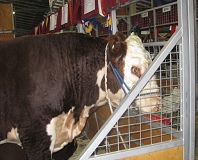Read the latest information on
Foot-and-mouth disease

Biosecurity planning is important for agricultural shows.
With the Royal Queensland Show (EKKA) underway and thousands of animals ready to ‘strut their stuff’ in front of the judges, it is a timely reminder of the simple biosecurity measures producers should adopt to prevent unwanted diseases, pests and weeds hitching a ride back from shows and events.
Animal Health Australia’s Executive Manager Biosecurity, Duncan Rowland, said there is a biosecurity risk whenever animals from different properties are brought together in common locations such as shows, saleyards and other events, but there are a number of measures producers can take to limit the risk.
“There are many ways that disease may be directly transmitted among animals and carried back to other properties. For example, transporting animals for others, or allowing direct contact, greatly increase the chance of transmitting a disease,” Mr Rowland said.
“Diseases and pests can be transmitted on contaminated boots and clothing, feeding and grooming equipment, tack, pens, feed and other common objects that come into contact with livestock at shows.”
“To avoid disease spread, it is recommended that producers do not allow their livestock to use communal water troughs, graze on the event grounds or feed on hay on the ground,” Mr Rowland said.
Producers should also check to see what biosecurity measures the venues have in place, but as horse owner Kim Wearn says, it is up to the animal’s owner to take their own precautions.
“When I take my horse to an event, firstly I make sure he is in good health before he gets on the trailer. When I arrive at the event I make sure that he is going into a clean stall and if it needs to be cleaned, I clean and disinfect it first,” Ms Wearn said.
“I also make sure my horse is not placed near sick horses, take my own clean water buckets and fully vaccinate my horse against disease,” Ms Wearn said.
Mr Rowland highlighted that biosecurity doesn’t stop when producers leave the shows and events with their animals.
“Transport vehicles should be thoroughly cleaned before returning home and immediately upon return.”
“As the signs of many diseases emerge days later, keeping returned stock quarantined for a period of 21 days is one of the simplest ways producers can protect both their livestock and their livelihood.”
“Similar precautions should be taken with any fodder brought back with you. Inspecting fodder for pests and weeds when purchasing, and isolating new fodder when it comes on to your property to check for the germination of any weeds, will help prevent the spread of weeds or pests that may contaminate your property,” Mr Rowland said.